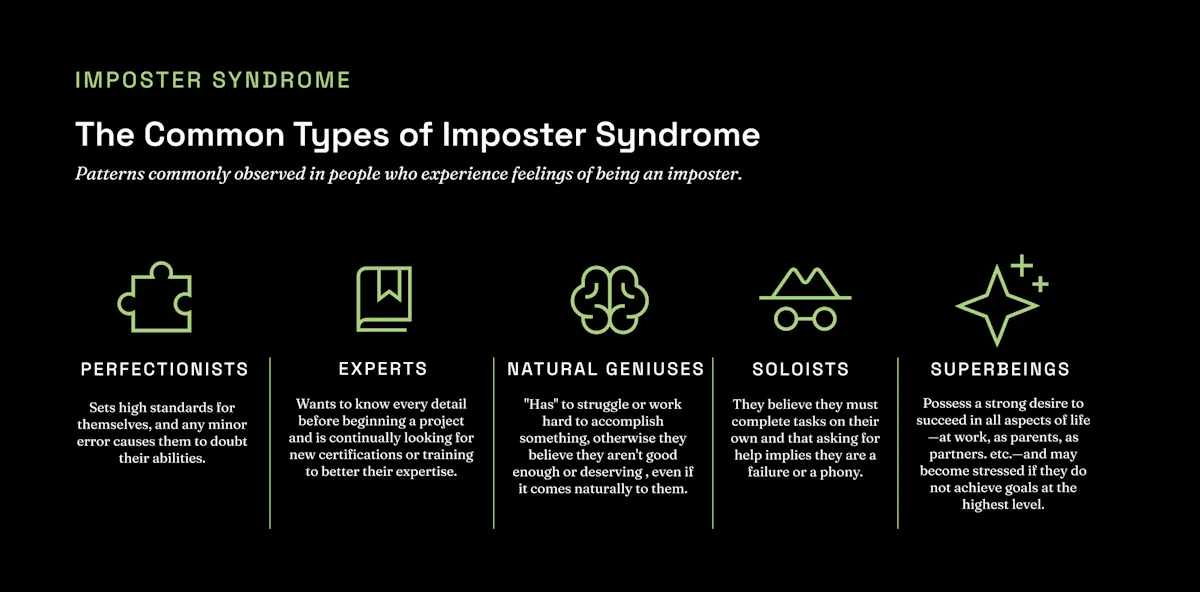Fill out the form to get more information about the Grace Hopper Program bootcamp of your choice.
04.18.2024
Overcoming Imposter Syndrome
By Yasmin Foster, Grace Hopper Program Senior Career Success Coach

As part of our ongoing career success event series, The Grace Hopper Program team at Fullstack Academy held a workshop on overcoming imposter syndrome. We began by asking participants to define imposter syndrome in their own words. Here are some of their responses:
“Thinking you don’t know enough even though you’re doing the work.”
“Lack of confidence or feeling like I don’t belong somewhere.”
“Questioning my knowledge, questioning my capabilities, or whether or not I have the experience.”
These answers had one consistent throughline: imposter syndrome feels like not belonging, even if you do.
By definition, imposter syndrome is a psychological condition characterized by persistent doubt concerning one's abilities or accomplishments–accompanied by the fear of being exposed as a fraud, despite evidence of one's ongoing success.
As was made clear by our participants’ responses, understanding imposter syndrome is the easy part. Those affected know what it means to feel like an imposter–and many even know (on paper, at least!) that these feelings are invalid, or based on perception rather than fact.
The challenge comes with overcoming imposter syndrome by recognizing and contextualizing these feelings–then putting measures in place to prevent them from impacting your personal and professional life.
Read on to learn actionable tips for overcoming imposter syndrome, then get back to believing in yourself and your abilities–no matter what those are.
Recognizing Imposter Syndrome
Remember:
Imposter syndrome can happen to anyone, but disproportionately affects women and gender-nonconforming professionals who are already more likely to attribute their accomplishments to luck or chance rather than to ability.
Symptoms include stress, anxiety, shame, and increased pressure to achieve or be perfect.
Most commonly associated with high-earning, high-profile, or newer, less traditional roles, imposter syndrome is prevalent throughout the tech industry and beyond.
Types of Imposter Syndrome
Understanding how to overcome your imposter syndrome starts with understanding your unique personality patterns and tendencies. Browse the table below and choose 1-2 types that describe yourself best.

Master Intentionality
Once you’ve determined your imposter syndrome type, you’re ready to use it to master intentionality. Essentially, this means keeping your full, true self—including your positive attributes and strengths—top-of-mind over your current self-perception. Here’s how:
- Compile and keep a list of professional compliments or feedback you’ve received from others. We’ve already established through uncovering your imposter syndrome type that your perception of yourself isn’t the whole story, so using positive, external sources of validation can help you recenter that perception.
Tip: this feedback doesn’t need to be a glowing review, and you don’t have to document it word-for-word, either. Simply choose something that resonated with you and note the way it made you feel to hear it.
- Practice words of affirmation. Words of affirmation are short, positive, and truthful statements designed to combat creeping feelings of doubt. Though it may feel silly, saying these aloud helps to remind you of your capacity to reach goals and improve yourself.
Tip: You can choose 3 or 4 statements from a general list like this one, then recite them morning and night to empower yourself daily and boost your confidence level.
Cultivate Self-Awareness and Self-Compassion
In practicing daily words of affirmation, you may find that you’re halfway to self-compassion! Self-compassion is exactly what it sounds like–referring to the compassion, grace, and acceptance you allow yourself as you endeavor to reach a goal.
At the same time, cultivating self-awareness allows you to recognize and categorize all your thoughts and feelings even if they’re disempowering. You can focus on recognizing each feeling - before trying to overcome it - using the following template.
The Feeling → Its Source → Potential Solutions
For example, if you’re feeling like your greatest barrier is fear, you can determine the source of that fear to help you start brainstorming potential solutions.
Fear → The Unknown → Research the basics to feel prepared
- Recognize that which you’ll only learn by doing
- Identify best and worst case scenarios
- Be afraid and move forward anyway!
Even if you’re having trouble identifying the source of your feeling, or coming up with potential ways to work through it, you can use the template as a simple list–leaving room to work through these feelings later. Committing your emotions to paper will help you to see them for what they are and increase your own self-awareness.
Recognize Your Experience Is Unique to You
We know all about how social media can lead us to feel bad about our lives in comparison to the appearance of others. But that “apples to oranges” comparison mentality can also creep up in unexpected places–especially during a major life change.
From LinkedIn posts to well-designed resumes and high-profile network connections, you’re more likely to notice other folks’ professional assets when working to improve your own.
Here are 3 things to remember to help recognize that your experience is unique to you:
Don't use the accomplishments of others to gauge your own, because you can’t! It’s not a fair or equal comparison. Think of them as apples versus oranges.
Accomplishing great things involves lifelong learning and skill-building – this also applies to the most confident and clouted individuals.
Concentrate on the only actionable thing you can do: becoming a better version of yourself each day.
Build and Maintain a Growth Mindset
A growth mindset is the belief that one's abilities are not predetermined or fixed–and that skills can be gained and improved upon indefinitely through time and effort.
It sounds simple, but of all the limitations placed on us, the hardest to overcome are usually those we place on ourselves. This is not to say that socioeconomic and systemic limitations and barriers are easy - or even possible - to overcome through individual time and effort alone. But of the barriers we can control, our internalized “I can’t” mindset runs deeper than we might think.
Here are some additional reminders to help build your growth mindset:
Don’t punish yourself if you don’t achieve a goal–yet. Remain objective by identifying specific and changeable behaviors that need to be improved.
Use your formal and experiential knowledge to support your growth going forward, and leverage it as you take the next steps.
Take your mistakes in stride and use them as learning experiences to develop.
Balance your external validation needs by taking constructive criticism seriously, not personally.
If you don’t know how to do something, ask for help. Seek advice from a supportive supervisor, peer, mentor, or even a career coach.
Take pride in your work. Work can be high-quality even if it is not flawless. There is always room to progress.
Pay It Forward
In your journey to unlearn harmful or limiting behaviors as a result of imposter syndrome, you may find that this work is never truly complete. Growth isn’t linear, and you’re likely to have good days and bad days throughout your career.
That said, you can still make permanent progress in overcoming imposter syndrome by simply staying consistent in your approach and sharing what you’ve learned with others. Why? Because mentoring, advocating for, or just sharing and listening with others is a powerful way to both affirm your knowledge and discover new expertise–all while helping someone like you do the same.
You can also do your part in reducing feelings of not belonging by collaborating with your team members to foster a welcoming environment for all–within and outside of the workplace. Be sure to promote diversity and inclusion initiatives where possible while recognizing the varied values and lived experiences of marginalized communities at work.
Finally, you can help overcome your imposter syndrome by simply reaching a career goal–and celebrating that feat with the recognition you deserve!
Learn more about the Grace Hopper Program for women and nonbinary coders
Accessible Tech Education for Women and Non-Binary Students.
Explore the Grace Hopper Program at Fullstack Academy, an immersive software engineering course for women and non-binary students


